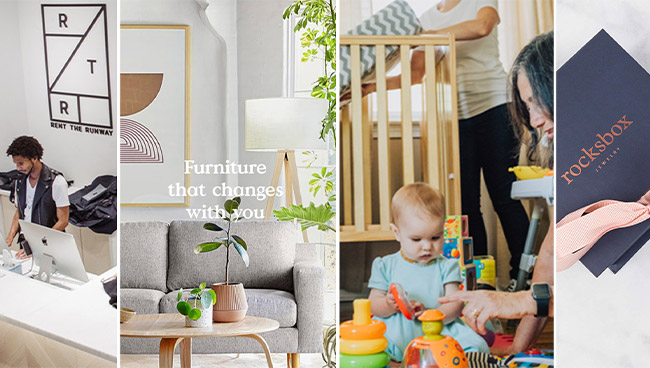There are times when retailers should worry about what’s behind them, and the rental retail economy is ushering in one of those times.
The once-fringe movement toward acquiring less “stuff” and instead paying for temporary use of pre-used necessities is rapidly becoming mainstream. And it’s changing retail sales in jewelry, handbags, fashion, electronics, home, auto, baby – and things we haven’t thought of yet.
The trend, an offshoot of the sharing economy, breaks down to two intertwined phenomena, what we call:
The “R&R of retail”: Rent and Recycle
The Rental Movement
– Which frees shoppers from the commitment of owning big-ticket, and trendy, items.
The Recycling Movement
– In which shoppers use and return hard-to-store or occasional products into a cycle of reuse.
The extent to which these combined movements will diminish traditional retail sales is still on the horizon and may never reach a significant share of shoppers; but we can see that retailers and brands that don’t take it seriously will at the least be caught struggling to explain sluggish sales growth.
The R&R Shopper Life
The first step to understanding the R&R shopper philosophy is recognizing ownership no longer represents status; experience does. To shoppers seeking a simpler life, temporary ownership offers liberation from the responsibilities that “things” represent, which delivers the added bonus of greater financial control. (Yes, of course, money is a big factor.)
Studies have found materialism can undermine a person’s wellbeing, while investing in experiences increases happiness. As explained in The Journal of Consumer Research: “Instead of buying and owning things, consumers want access to goods and prefer to pay for the experience of temporarily accessing them.”
The upshot: Temporary ownership is changing shopper beliefs about what is worth owning at all. Shoppers have already voted that it’s not worth buying new baby toys that will end up in a closet after five weeks; and it’s smarter to rent a formal dress or a car that’s only needed for one day.
The Internet takes on a whole new shopping form with upstart “retailers” like Rent the Runway, Feather, BabyQuip and Rocksbox, which offer rental and/or subscription apparel, furniture, baby cribs and jewelry, respectively. And now established brick-and-mortar brands are joining in. REI rents camping gear; Office Depot sublets co-working office space.
Alongside the rentals are the brands recycling their own products. The North Face restores and resells gear that has been used or damaged; Eileen Fisher gives customers who return used items $5 gift cards through its Renew line. Burberry has stopped destroying “unsellable” items and instead repairs, recycles or donates them (it is a core partner of the Make Fashion Circular Initiative).
Joining the R&R Economy: 3 Basic Guidelines
These movements are incrementally chipping away at retail sales. So let’s apply the lesson everyone learned from online shopping: If you can’t beat ‘em, join them. Here are three basic guidelines for entering the preowned economy.
- Be product appropriate. Pricey or hard-to-store products are ripe for rentals. Also, shoppers should be comfortable using something someone else used. Think of anything that is not handled and personalized every day. Snow shoes, yes. Slippers, no.
- Ensure the infrastructure is in place. R&R requires some R&D, specifically in back-end digital systems to support product listings and descriptions, transactions and tracking. Some third-party providers, such as ThredUp’s Upcycle service, will do this for you.
- Support an R&R culture. Shifting from selling products for life to providing them temporarily takes an adjustment in thinking. Even if the brand does both, it has to ensure internally as well as among shoppers that temporary ownership aligns with the brand promise.
Unlike the preowned goods trading hands, the rental economy is likely to become a more permanent part of retail. Those retailers that don’t discount its effect on the industry will realize the most profitable part of the sharing economy: market share.


